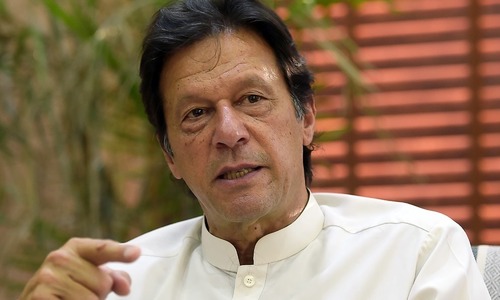PM’s China visit

WHEN Prime Minister Imran Khan chose to travel to China over staying in Pakistan as mobs and violent protesters took to the streets across this country, PTI officials defending the foreign trip amidst domestic chaos argued that the economy was in dire straits and urgent assistance was needed. The implication was that Prime Minister Khan was required to go to China to secure quick money, loans, assistance and investments to shore up the Pakistani economy and state finances.
It is a norm in diplomacy that high-level meetings take place after the details are already agreed to by other officials, the top government functionaries meeting to sign accords in a ceremonial manner.
But Mr Khan was already in China for several days when on Saturday, a senior Chinese official, Vice Foreign Minister Kong Xuanyou, made a remarkable statement. Pledging that China has in principle decided to help Pakistan tide over its current economic difficulties, Mr Kong added: “As for the specific measures to be taken, the relevant authorities of the two sides will have detailed discussions.”
On Sunday, a joint statement marking the formal end of Prime Minister Khan’s trip to China appeared to confirm what was stated a day before by Vice Foreign Minister Kong.
In the joint statement, there is no assistance package announced, just boilerplate diplomatic language reaffirming the deep strategic ties between China and Pakistan.
At least two points need to be made here. First, if a formal assistance package had not been already agreed to, what was the urgency for Mr Khan to leave Pakistan in the midst of a national crisis?
Surely, Mr Khan was not going to negotiate in person with senior Chinese officials — the Chinese officials have themselves pointed to detailed negotiations needing to take place between the relevant authorities of the countries.
Second, and more importantly, given that it is an ongoing issue, why have the “detailed discussions” yet to take place? It is possible that China is driving a hard bargain, but that would not be unexpected.
However, did the Pakistani side prepare for hard negotiations? Or have the PTI government’s economic managers once again shown their inexperience and expected that a rescue package will be assembled because of Pakistan’s geopolitical importance or perhaps Prime Minister Khan’s political standing?
As Mr Khan comes home empty-handed, he will return to a country recovering from days of protests and yet another state capitulation to violent religious extremists.
The challenges are increasing, but the government’s capacity to address these challenges does not appear to be increasing quickly enough. The three-month mark for Prime Minister Khan and his PTI government are fast approaching.
Mr Khan was right in demanding time to adjust to the responsibilities of high office. But the country needs the PTI to learn faster than it appears capable or willing to.
Published in Dawn, November 5th, 2018
















































